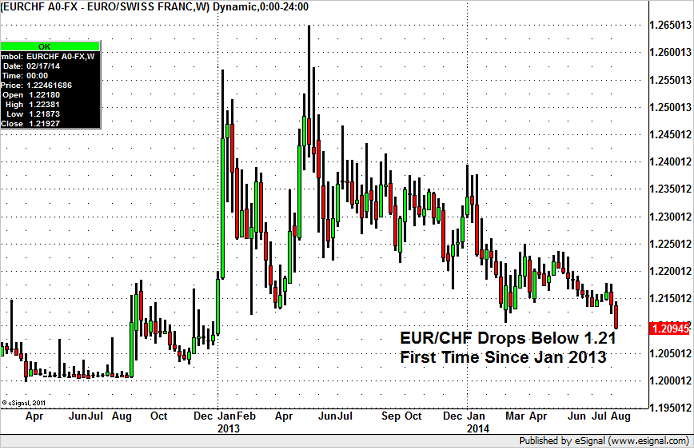“Just because we removed the word ‘patient’ from the statement doesn’t mean we are going to be impatient,” Clever words found by Fed boss Yellen to make sure that investors are not getting to anxious about future rate hikes. But it was the ‘dot plot’ that really did the job. FOMC participants significantly lowered their projections for what is the appropriate level of the federal funds rate for the coming years. Hence, lower rates for longer. Mind you, markets expect the Fed to take it even more easy than the new dots imply.
Markets expect the #Fed to take it even slower than the dots. Nice chart via @davidmwessel https://t.co/Mo9iqwfQO0
—
jeroen blokland (@jsblokland) March 19, 2015
The dovish message by the Fed resulted in some extraordinary moves. The most striking one: a real short-squeeze in the euro that made the USDEUR exchange rate spike 4{01de1f41f0433b1b992b12aafb3b1fe281a5c9ee7cd5232385403e933e277ce6} to 1.10 at one point.
Short squeezed! Massive move in the #EURUSD after the #Fed decides to take it easy on rate hikes. https://t.co/S2eCWcKiil
—
jeroen blokland (@jsblokland) March 18, 2015
But things reversed rather quickly. Within a day the euro fell back to below 1.07 and the mini rally in oil prices was also soon forgotten.
The #Yellen rally is reversed very quickly. Euro back at pre-FOMC levels (1.0650) and #oil back below USD 43. https://t.co/ZesOiGXiSc
—
jeroen blokland (@jsblokland) March 19, 2015
Equities managed to hold on to (part of) their gains made after the Fed announcement, though.
The #Fed in one graph? RT“@FirstWordNick: Stocks go vertical on the Fed news https://t.co/DgZpW9dKxJ”
—
jeroen blokland (@jsblokland) March 18, 2015
The significant lowering of the dots shows that the Fed is not unmoved by the dismal macro data that have been coming in recently. Economic numbers keep disappointing, sending the Citi economic surprise index ever lower. Also, the strength of the USD was briefly referred to in the Fed statements.
Still ugly! US Macro surprises. Europe looking much better. https://t.co/KJ3gXL9DYB
—
jeroen blokland (@jsblokland) March 20, 2015
On the other side of the Atlantic tensions rose again between Greece and other Euro zone members. And this isn’t just about the, what proved to be, fake, middle finger. A falling budget surplus and lack of proof of the demanded reforms made a number of European politicians refer to a certain Grexit if things don’t change. And so, the Greek 3-year government bond yield shot up again.
Meanwhile in #Greece. 3-year bond yield now at 21.4{01de1f41f0433b1b992b12aafb3b1fe281a5c9ee7cd5232385403e933e277ce6} and rising. https://t.co/xevaCO2JVy
—
jeroen blokland (@jsblokland) March 19, 2015
Meanwhile, the Greek default probability also increased significantly. Investors estimate there is a probability of more than 80{01de1f41f0433b1b992b12aafb3b1fe281a5c9ee7cd5232385403e933e277ce6} that Greece will eventually default. And not because of the fake middle finger.
Pressure on #Greece and #Eurozone increasing as Greek default probability tops 80{01de1f41f0433b1b992b12aafb3b1fe281a5c9ee7cd5232385403e933e277ce6}. via @Schuldensuehner https://t.co/NodGSWHnTt
—
jeroen blokland (@jsblokland) March 20, 2015
Not that a Greek default would be anything special. The table below shows that Greece has spent half of the last 200 years or so in default. You would expect that we knew how to deal with this by now, right?
#Greece! RT“@RudyHavenstein: Greece in default/restructuring 50.6{01de1f41f0433b1b992b12aafb3b1fe281a5c9ee7cd5232385403e933e277ce6} of time from 1829 to 2008 per Rogoff/Reinhart. https://t.co/bhJr2d3XPf”
—
jeroen blokland (@jsblokland) March 20, 2015
European Equity markets couldn’t be bothered by the looming Greek abyss. Helped by Draghi, Yellen and the euro, European stocks marched on to reach levels near the highs of 2000 en 2007. For investors with a fear of heights this could cause some problems.
We have been here twice before! European #equity markets near highs of 2000 and 2007. https://t.co/OTPeCyoqWg
—
jeroen blokland (@jsblokland) March 19, 2015
Oh, just to be sure, European bond markets couldn’t be bothered either. The German 10-year government bond yield fell to a low of 0.18{01de1f41f0433b1b992b12aafb3b1fe281a5c9ee7cd5232385403e933e277ce6} this week. Still 38 bps left before the minimum level for QE-buying is reached.
German 10-year bond yield now at 0.18{01de1f41f0433b1b992b12aafb3b1fe281a5c9ee7cd5232385403e933e277ce6}! 38bps left… https://t.co/wPl4jucJHe
—
jeroen blokland (@jsblokland) March 19, 2015
Compared to China, the equity market rally in Europe is peanuts. Leaving everything fundamental behind, Chinese stocks continue to soar. Forget about profits, profit margins, PMIs, or valuation. Chinese market returns are explained by (expectations of) lower interest rates, (expectations of) a lower currency, the number of new stock market accounts and market turnover. For people trying to explain market returns by fundamental factors this could cause problems. Especially those with a fear of heights.
Is this a bubble? Chinese stocks have risen 72{01de1f41f0433b1b992b12aafb3b1fe281a5c9ee7cd5232385403e933e277ce6}(!) YoY, with PMI below 50. #China https://t.co/RU3ekPGw7u
—
jeroen blokland (@jsblokland) March 17, 2015
This completes the Week End Blog. Thanks for reading and enjoy your weekend!
Filed under: FINANCIAL MARKETS, MACRO Tagged: bubble, China, Fed, Federal Reserve System, Greece, Grexit, Yellen 
![]()
SOURCE: Jeroen Blokland Financial Markets Blog – Read entire story here.

